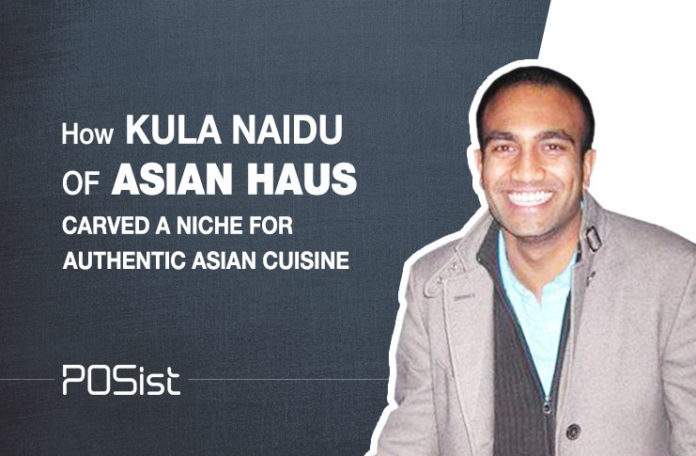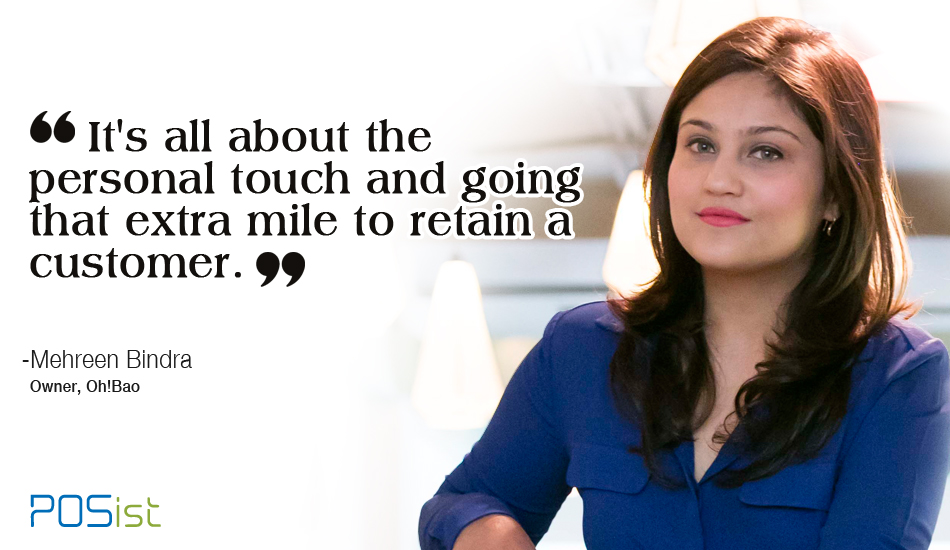Even though there’s a Chinese food joint, van or food truck on every nook and cranny of major Indian cities, those craving authentic Asian food are yet to have their taste buds satiated in a substantial manner. The reason is that it’s the adopted Indian Chinese cuisine that’s on sale on the road as well as restaurants, and not the authentic preparations. For the connoisseurs, there are barely any options except going to a five-star hotel and shell out huge sums of money to be able to taste authentic food.
Candid Conversation with Kula Naidu About How He Made Asian Haus a Success
While Kula Naidu wasn’t exactly trying to serve the masses with his venture of building a catering company that offers authentic Asian cuisine, he ended up doing just that. Naidu, along with his three partners, decided to start a catering company six years ago but realised that to establish brand presence he would have to introduce people to the food first. And this led to the inauguration of Asian Haus, a food delivery business in South Delhi and Gurugram which offers authentic cuisine at a fraction of five-star hotel prices.
“We wanted to build a catering company and we saw that nobody knew about this food and nobody had tasted this kind of stuff. Food is all about experience, right? That’s what we thought before so we started a delivery company. We thought we will showcase our food and see how it goes from there. We launched through WhatsApp and BBM, it was a fun start,” he said.
By launching on WhatsApp and BBM, Naidu meant that he sent invites to people in his network through these platforms to try their food out for free for two weeks in exchange of feedback. This experiment proved incredibly successful as soon the orders started flowing and month on month, the company kept growing.
Soon after, came Sushi Haus from the stables which was a sushi oriented brand. This was followed by the launch of Delhi Haus for north Indian cuisine as no catering can be called complete without Indian food.
Recently, Amma’s Haus was launched which is the south Indian food brand. This makes it four exceptional brands under Naidu’s supervision and strong sales numbers have already made him think about expanding to different cities and even go international in a couple of years.
Lazer Sharp Focus to Build a Brand
So, how did Asian Haus reach here in a limited amount of time?
“We have six different kitchens but we have two base kitchens. Each kitchen has its own head chef and each kitchen has its own space. Obviously, we have common delivery and staff operations but the kitchens remain separate. A lot of consistency is through feedback and speaking to chefs on a regular basis, making sure that they are aware of what’s happening,” he said.
Naidu further said that the brand’s core focus is customer service and loyalty which sets it apart. Even though the brand’s offerings such as authentic Chinese, Japanese and Singaporean cuisines might be new to the Indian taste buds, Asian Haus has managed to make a name for itself in the posh South Delhi market due to its top-notch quality, packaging and service which a lot of brands that opened on the same lines aren’t able to offer.
Naidu terms it the copycat phenomenon.
“When we launched there was one kitchen in GK area and now there are 15 and they are all doing the same. We try to keep things new with food and make things as customers demand. We take our feedback very seriously. Since we have been there for so long, we struggled initially with consistency and food quality which we have nailed over this time. This is what a lot of these brands will have to go through,” he said.
While there are six locations already operational in Delhi, they are concentrated towards South Delhi and Naidu said that it’s a conscious decision to target markets one by one. He said that other areas such as West Delhi aren’t ripe for accepting these cuisines yet and trying to teach the customer about a cuisine is a net loss for a business.

“Bombay would be a priority for us. It’s just a little more work and you will have another kitchen in a different city than one more in the same city. A lot of people say that it’s easier to manage a brand in the same city than in a different city. But for an incremental amount of work, it’ll be a much larger pool. And we can then say it’s a multi-city format,” he said.
Delighting Indian Taste Buds
Speaking about his pricing strategy which could be construed as high by a section of the society, Naidu explained that there was a strong reasoning behind targeting certain sections.
“We picked a certain price point, a market segment because they will be appreciative of the cuisine. We have done QSR and target all forms of the market but if people don’t understand something, they hate it. For a lot of people who haven’t been to Japan, they aren’t going to like this. Obviously, we added a lot of flavours and made some of it Indian Chinese so that it does cater to everyone but that’s a good way for it to stand out,” he said.
Not just pricing, in order to ensure that customers keep coming, Asian Haus has crafted a menu quite carefully. The idea is to make sure that not a lot of items on the menu are unknown to people and still serve them with authentic cuisine by adding talking points.
“We have kept our ratios quite smart, we have done about 70% which are traditional items like Chilli Chicken. And we have gone ahead and added talking points to all of these. Our chilli chicken is not the traditional one, it’s very different. We have really done 30% of experimental/unheard of items,” he said.
And how did they make it happen?
“We got in consultant chefs. They showed different styles, plate profiles and other things to our chefs. My other partner owns hotels so he is very familiar with the hospitality space and with my experience in the food industry, it wasn’t very hard for us to find chefs,” he said. “There was a lot of training that we spent our time on and that’s what really how we managed to bring the brand to life.”
Ingredients for Success
Speaking about the most important ingredients to bring success to a food brand, Naidu put his money on technology, location and food quality among other things.
“The dining is all about location, no matter what. Then comes your product, branding. The software also has a huge part to play. I think having the right software to manage your business is really important. And then using the software correctly is crucial too,” he said.
In his advice to new entrants, he also said that people should be able to move quickly as the industry is very dynamic or they would be setting themselves up for disappointment.
“And you have to be able to make changes quickly but they don’t. If your alcohol license has come today, your bar menu should be up today. A lot of people take things for granted, they are very slow to react and that causes more losses. Being on it, reacting quickly is probably the number one thing to focus on,” he said.
For restaurants, he said that having the right technology and software can help market the place much better but it’s crucial to use the data right and in a timely manner. He calls this strategy retaining old customers than spending money to bring new ones in.
Difficulties Faced In Bringing Asian Haus to Life
Speaking about his own struggles while bringing Asian Haus to life, Naidu said that the biggest challenge was attrition, barriers to entry in the industry and training blue collar workers.
“ When we are in the delivery format, you know there’s a blue-collar industry. You are dealing with a lot of people who are simple in nature and they don’t understand the same things that people at MNCs would do. Consistency is obviously a huge struggle and that was really really hard,” he said.
Apart from this, there were other issues too such as shortage or unavailability of the ingredients in the country which forced Asian Haus to import them from Malaysia. Even though some of these problems have been solved now, there are new ones to tackle.
Among these is dealing with the partnership format where each partner comes with a different viewpoint on things and coordinating things to reach a decision is a cumbersome and critical process. In addition, recent government moves, as well as the disruption of the delivery market by Swiggy and the likes, have also put pressures on the business, Naidu said.
“Now the ballgame is different. There are 150 people in the company. Decisions need to be made a lot quicker. I think labour costs have gone nuts. Swiggy and Zomato have ruined it for a lot of us. Before you could get a delivery person for Rs 10000-Rs 12000 today it’s 16k-20k. A lot of labour laws, GST, and the government policies have killed us. It’s been really hard but I guess we have no choice,”
In addition, people have also copied the name Haus for which Naidu had to fight a long drawn court battle which he ultimately won. While this ensures the protection of brand name from now on, it was a costly and time-consuming affair, he said.
But the cash registers have to be kept ringing and to this end, Asian Haus uses insights from their technology and restaurant management software expertly to make sure customers are well tended to.
“Marketing is all about giving it to customers and asking them to do for you. If someone orders food more than Rs 10,000 we say this meal is free for you. If we are opening something new, we send it to them for free to try. Putting a magazine ad is not going to help you, a newspaper ad may help you slightly. You will really eat only where your friends recommend and you might rarely also eat what you see on Swiggy and Zomato,” he said.
He added that flyering is also a waste of money for an establishment like theirs and only works for the likes of Domino’s and Pizza Hut.
Even though the company runs a delivery-only setting which is cheaper than dining business, Asian Haus is not in a hurry to expand and definitely not through the franchise model, according to Naidu. Expressing his reservations about franchising, he said that it gets complicated because of different interests at play and there’s often a lack of synergy.
“I am not a fan of the franchise, to be honest. A lot of people who pick up franchise don’t realise that they are picking up a business they think it’s something automated. If a franchise falls short, that damages the whole brand. Delivery is anyway not very capital expensive so we don’t need it to expand our business nor do we want to expand that quickly,” he said.


















